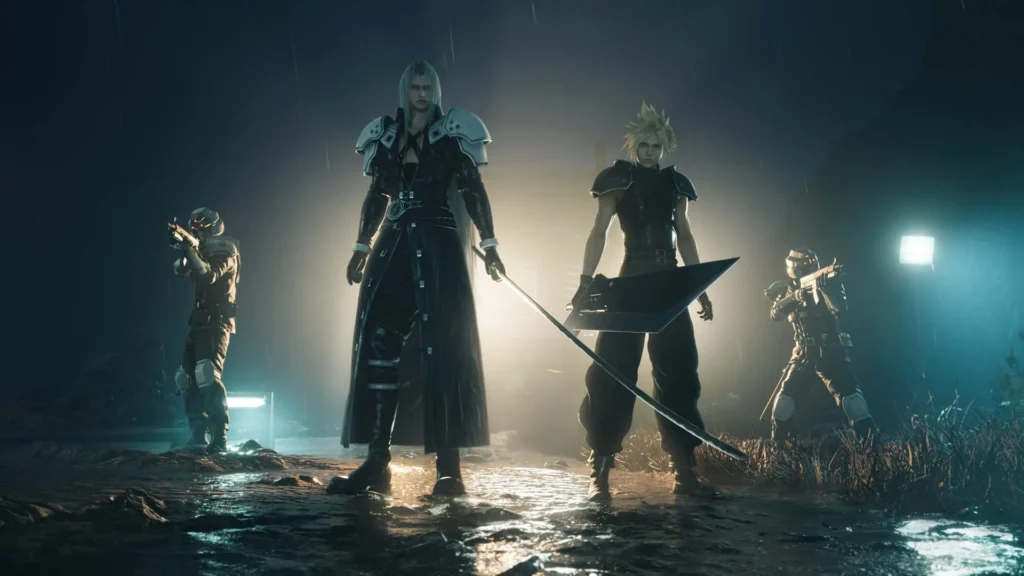Platform | PlayStation 5 |
|---|---|
Publisher | Square Enix |
Genre | Action RPG |
Release Date | 02/29/2024 |
Final Fantasy 7 Rebirth, the much-anticipated second installment in the Final Fantasy 7 Remake trilogy, has been generating immense excitement among fans. Square Enix recently confirmed that there will be no downloadable content (DLC) for this title, a surprising decision given the current trends in the gaming industry where DLC often extends the lifespan of major releases. In this article, we explore the reasons behind this decision and what it means for fans of the series.
—
A Trilogy with a Clear Vision
Square Enix has emphasized that Final Fantasy 7 Rebirth is part of a meticulously planned trilogy. Each installment—Remake, Rebirth, and the yet-to-be-named third entry—has a specific role in telling the complete story of this reimagined classic.
Self-Contained Experience
- Focus on the Core Narrative: By avoiding DLC, Square Enix ensures that players experience the story as intended, without fragmented add-ons or optional side content that could dilute the narrative.
- Continuation Over Expansion: The trilogy format prioritizes moving the story forward rather than adding extra content to a single installment.
This decision aligns with the studio’s desire to deliver a polished, self-contained experience that sets the stage for the trilogy’s grand finale.
—
Lessons Learned from Final Fantasy 7 Remake
The release of Final Fantasy 7 Remake saw the addition of the DLC episode INTERmission, which introduced Yuffie as a playable character. While it was generally well-received, it also highlighted some challenges that likely influenced the decision to forgo DLC for Rebirth.
Fragmentation of Content
- Accessibility Issues: Players who skipped INTERmission missed key story details that enhanced the overall narrative.
- Platform Limitations: INTERmission was exclusive to the PlayStation 5 for a time, which alienated players on older platforms.
By excluding DLC for Rebirth, Square Enix avoids fragmenting the player base and ensures that everyone has access to the full story within the main game.
—
Development Priorities
Creating DLC requires substantial resources, including time, budget, and manpower. Square Enix has opted to channel all these resources into the development of the trilogy’s third installment rather than expanding Rebirth post-launch.
Streamlined Development
- Focus on the Trilogy: By concentrating on the next entry, the development team can maintain momentum and avoid delays in completing the trilogy.
- Avoiding Scope Creep: Adding DLC could detract from the primary goal of crafting a cohesive and ambitious conclusion to the story.
This decision reflects Square Enix’s commitment to delivering the highest quality experience for fans, both in Rebirth and the trilogy’s conclusion.
—
Player Expectations and Modern Trends
In today’s gaming landscape, DLC is often used to monetize games further or extend their lifecycle. However, Final Fantasy 7 Rebirth stands out by rejecting this model, focusing instead on delivering a complete and satisfying experience at launch.
Trust in the Fans
- Respecting the Original Vision: Square Enix acknowledges the legacy of Final Fantasy 7 as a single, cohesive narrative and seeks to honor that tradition.
- Avoiding Monetization Fatigue: By not releasing DLC, the studio avoids criticism of unnecessary monetization practices and reinforces the value of the base game.
This approach may set a refreshing precedent in an industry increasingly reliant on additional content to sustain engagement.
—
The Promise of a Fully Packed Game
Square Enix has assured fans that Final Fantasy 7 Rebirth will be an expansive game, packed with content and exploration. The decision to forgo DLC indicates that the developers aim to deliver everything players expect—and more—in the base game itself.
What to Expect
- Massive World: The game promises vast areas to explore, with iconic locations from the original Final Fantasy 7 rendered in stunning detail.
- Rich Storytelling: With a longer runtime than its predecessor, Rebirth will delve deeper into the characters, their relationships, and the world of Gaia.
- Side Content: Players can look forward to side quests, mini-games, and optional challenges that provide hours of additional gameplay.
By delivering a content-rich experience upfront, Square Enix ensures that Rebirth feels complete and satisfying without the need for post-launch additions.
—
Fan Reactions
The decision to exclude DLC has sparked mixed reactions among fans. Some appreciate the focus on delivering a complete experience, while others worry about missing out on potential additional content.
Positive Reception
- Many fans are relieved that the game will not be divided by paid expansions or fragmented content.
- The focus on moving the story forward aligns with the expectations for a tightly planned trilogy.
Concerns
- Some fans enjoyed INTERmission and hoped for similar side stories in Rebirth.
- Speculation exists about whether the game will still receive updates or patches post-launch for quality-of-life improvements.
—
Square Enix’s decision to forgo DLC for Final Fantasy 7 Rebirth reflects a commitment to delivering a complete and polished experience that stands on its own. By focusing resources on the trilogy as a whole, the developers ensure that players can fully immerse themselves in the story without distractions or interruptions. While the absence of DLC may feel unusual in today’s gaming market, it underscores the unique vision behind the Final Fantasy 7 remake project, one that prioritizes narrative cohesion and player satisfaction over monetization.
As fans eagerly await the release of Final Fantasy 7 Rebirth, the promise of a content-packed game with no need for post-launch add-ons is a testament to the confidence Square Enix has in their work—and the trust they place in their players to appreciate it.














